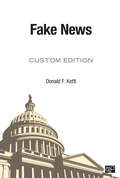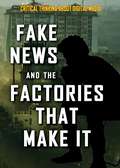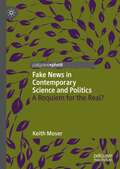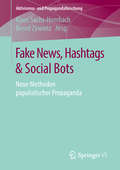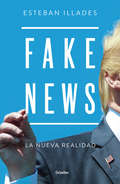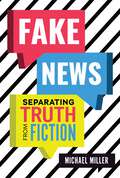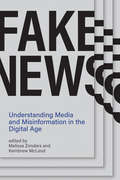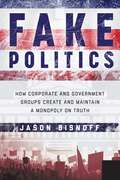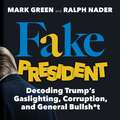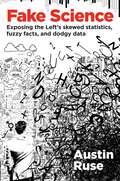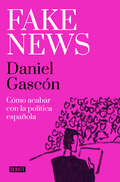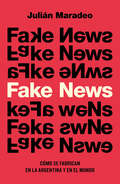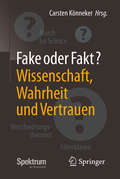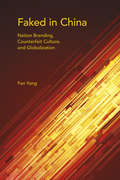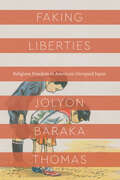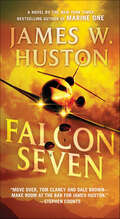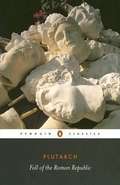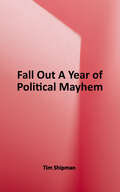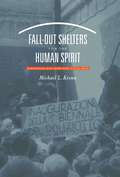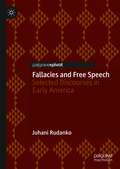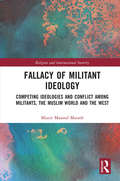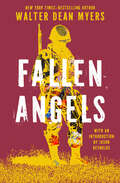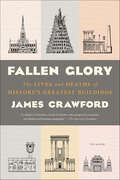- Table View
- List View
Fake News and the Factories that Make It (Critical Thinking About Digital Media)
by Kristina Lyn HeitkampOnce on the fringe, fake news has become mainstream. From bogus social media accounts to Russian troll factories, phony news muddies the social and political discourse, and is a threat to our democracy. This high-interest book defines fake news and reveals the people behind the spread of disinformation. This text directly correlates with state journalism standards about developing media literacy. Readers will also glimpse the future of fake news and the alarming technologies used to make it, such as face-morphing technology. This book will help readers navigate the messy world of fake news.
Fake News in Contemporary Science and Politics: A Requiem for the Real?
by Keith MoserThis transdisciplinary book investigates the profound repercussions of living in a post-truth world in which 'alternative facts' and post-truth knowledge claims, often bordering on the absurd, have replaced the real in the collective imagination of millions of people around the planet. Through discussions on climate change denial, the anti-vaccination movement, the January 6th Insurrection and the Russia-Ukraine War, this study explores the gravity of the current 'infodemic,' or the increasing inability of a large segment of the population to distinguish between reality and misrepresentation, and the destabilizing impact this infodemic has on democratic models of governance around the globe, coinciding with the rise of autocratic forms of populism.
Fake News, Hashtags & Social Bots: Neue Methoden populistischer Propaganda (Aktivismus- und Propagandaforschung)
by Klaus Sachs-Hombach Bernd ZywietzDer Band versammelt Beiträge zum Thema der gegenwärtigen „digitalen“ Propaganda, wie sie im Kontext des Populismus eine besondere Rolle spielt. Sie wird als politisch-mediales Phänomen analysiert und als gesellschaftlich-kommunikatives Herausforderung: dies hinsichtlich der Sorge vor der einseitigen Beeinflussung einer neuen, fragmentierten „Masse“ im Netz sowie um die für medienvermittelte Demokratien fundamentale Möglichkeit des vertrauensvollen Austausches von Informationen und Meinungen auf Basis diskursethischer Prinzipien.
Fake News: La nueva realidad
by Esteban IlladesEl mayor peligro del acceso ilimitado a la información es que siempre hay alguien que la acepta sin cuestionar. En la prensa escrita y en la digital, en las redes sociales y en los medios tradicionales, un torrente de mentiras, propaganda e inexactitudes -motivadas por el afán de dinero, notoriedad o poder- se mezcla y confunde con el reporte de hechos reales. Jamás ha sido tan fácil ser engañado: a la censura y el espionaje se han sumado la sobreinformación y las fake news. En este escenario, que parece sacado de una distopía orwelliana, la ética periodística, la confirmación y el rigor parecen reliquias olvidadas. El fenómeno es poderosísimo y ya define el rumbo del mundo: en buena parte gracias a la difusión de «noticias» falsas, Donald Trump ganó la Presidencia de Estados Unidos. Y no es un fenómeno ajeno. En México, las fake news son pan de todos los días, como lo demostró el «caso Frida Sofía». Ya jugaron un papel clave en la elección de 2012 y sin duda serán protagonistas este 2018. En este libro, el periodista Esteban Illades examina decenas de casos en los que la confusión y la falsedad han llevado a resultados catastróficos, y explora las razones de que -en plena Era del Conocimiento- sigamos creyendo datos imposibles y, por el contrario, negando evidencias irrefutables.
Fake News: Separating Truth from Fiction
by Michael MillerWhile popularized by President Donald Trump, the term "fake news" actually originated toward the end of the 19th century, in an era of rampant yellow journalism. Since then, it has come to encompass a broad universe of news stories and marketing strategies ranging from outright lies, propaganda, and conspiracy theories to hoaxes, opinion pieces, and satire—all facilitated and manipulated by social media platforms. This title explores journalistic and fact-checking standards, Constitutional protections, and real-world case studies, helping readers identify the mechanics, perpetrators, motives, and psychology of fake news. A final chapter explores methods for assessing and avoiding the spread of fake news.
Fake News: Understanding Media and Misinformation in the Digital Age (Information Policy)
by Kembrew McLeod Melissa ZimdarsNew perspectives on the misinformation ecosystem that is the production and circulation of fake news.What is fake news? Is it an item on Breitbart, an article in The Onion, an outright falsehood disseminated via Russian bot, or a catchphrase used by a politician to discredit a story he doesn't like? This book examines the real fake news: the constant flow of purposefully crafted, sensational, emotionally charged, misleading or totally fabricated information that mimics the form of mainstream news. Rather than viewing fake news through a single lens, the book maps the various kinds of misinformation through several different disciplinary perspectives, taking into account the overlapping contexts of politics, technology, and journalism.The contributors consider topics including fake news as “disorganized” propaganda; folkloric falsehood in the “Pizzagate” conspiracy; native advertising as counterfeit news; the limitations of regulatory reform and technological solutionism; Reddit's enabling of fake news; the psychological mechanisms by which people make sense of information; and the evolution of fake news in America. A section on media hoaxes and satire features an oral history of and an interview with prankster-activists the Yes Men, famous for parodies that reveal hidden truths. Finally, contributors consider possible solutions to the complex problem of fake news—ways to mitigate its spread, to teach students to find factually accurate information, and to go beyond fact-checking.ContributorsMark Andrejevic, Benjamin Burroughs, Nicholas Bowman, Mark Brewin, Elizabeth Cohen, Colin Doty, Dan Faltesek, Johan Farkas, Cherian George, Tarleton Gillespie, Dawn R. Gilpin, Gina Giotta, Theodore Glasser, Amanda Ann Klein, Paul Levinson, Adrienne Massanari, Sophia A. McClennen, Kembrew McLeod, Panagiotis Takis Metaxas, Paul Mihailidis, Benjamin Peters, Whitney Phillips, Victor Pickard, Danielle Polage, Stephanie Ricker Schulte, Leslie-Jean Thornton, Anita Varma, Claire Wardle, Melissa Zimdars, Sheng Zou
Fake Politics: How Corporate and Government Groups Create and Maintain a Monopoly on Truth
by Jason BisnoffIn “grassroots” campaigns, the grass isn’t always green—or natural.In today’s chaotic world, where the multiplication of information sources creates competing narratives, credibility is the key to winning the war of ideas. This is the reason why governments and corporations resort to astroturfing—creation of ostensibly grassroots movements set up to advance political agendas and commercial campaigns. The democratization of information and polarization of politics offer a perfect storm.Fake Politics tells the stories of how this practice has transformed political activism into a veiled lobbying effort by the rich and the powerful. Through a series of vignettes involving the tea party, oil industry, big tobacco, big data, and news media, this book will explore the similarities and differences between various campaigns that appeared as grassroots but, in reality, were lobbying efforts fueled by governments, corporations, major industries, and religious institutions.The process, named for the artificial grass fields at football stadiums and high schools across the country, became so prevalent in the last two decades that it now sits at a tipping point. In the era of “fake news” and “alternative facts,” with the truth well on its way to becoming indistinguishable from fabrication, what can the past of astroturfing tell us about the future of grassroots activism?
Fake President: Decoding Trump's Gaslighting, Corruption, and General Bullsh*t
by Mark Green Ralph Nader"Read Fake President….This book can help us replace Trump with truth." —Gloria Steinem "Terrific new book. Fake President informs as it entertains." --Laurence TribeAn incisive, witty roadmap into the disinformation and betrayals of President Trump—just in time for the impeachment hearings and the 2020 election. Donald Trump was lawfully selected as the US president...but is still a "fake" president because he simply lacks the integrity, intelligence, and stability to perform the duties of the office as the Constitution intended. "If you spend so much time golfing, tweeting, and seething," write Green and Nader, "it's understandable that a POTUS doesn't get around to appointing one-third of all agency inspector generals...Might as well expect a surgeon to be an opera singer." As the House Impeachment Inquiry unfolds based on a similar premise, Fake President decodes many of his worst scandals and "twistifications" (a Jefferson coinage). And it&’s bound to get even worse as the House gets closer to actual Articles of Impeachment and the Fall election approaches. Since it's nearly impossible to keep track of Trump's "daily lava of lies," two of America&’s foremost public advocates do that work for you. This is your one-stop shop that explains what the Lyin' King means to our democracy. It&’s a cheeky, deadly rebuke of Trump&’s incorrigible "fakery"...from his dishonesty about foreign policy to blatant ignorance about the environment to his messianic narcissism.Fake President is an essential guide to help you understand the two biggest news stories of the coming year—impeachment and the 2020 presidential election.
Fake Science: Exposing the Left's Skewed Statistics, Fuzzy Facts, and Dodgy Data
by Austin RuseIf you listen to any political argument, you're eventually bound to hear something like: "The science is settled on this." Or: "Just look at the statistics!" Or: "There have been studies that say..."You'd think we were living in the golden age of science and reason. But the truth is far more sinister, says Austin Ruse. We're actually living in the age of the low information voter, easily mislead by all-too-convincing false statistics and studies. In Fake Science, Ruse debunks so-called "facts" used to advance political causes one after the other, revealing how poorly they stand up to actual science.
Fake news: Cómo acabar con la política española
by Daniel GascónUna antología de artículos y viñetas esencial para acabar,de una vez por todas, con la política española. «Gascón, lúcido analista de la política española.»Javier Cercas, El País La Ley Gascón consta de un único artículo y una apostilla, a saber: «Toda sátira es profecía. Toda parodia es eufemismo». Es posible que esto sea cierto en todas las épocas, pero una de las características de la conversación pública actual es el ciclo informativo de veinticuatro horas y siete días a la semana, que va muy deprisa y que a la vez no se dirige a ninguna parte. No solo se confunden lo urgente y lo importante, también se mezclan lo real y el simulacro. En los últimos cinco años España ha vivido un golpe de Estado posmoderno, cuyos protagonistas todavía no saben si iba en serio o no; una moción de censura contra un presidente del Gobierno que decidió emborracharse mientras lo echaban, y de la que salió un nuevo presidente apoyado por los que habían protagonizado un pronunciamiento civil unos meses antes; el primer Gobierno de coalición, con el sostén de un partido que se oponía a la casta y que consiguió colocar a un matrimonio en el Consejo de Ministros; el ascenso y hundimiento de un partido de centro liberal y el surgimiento de una fuerza de ultraderecha. Mientras, científicos sociales explicaron lo que es el sesgo y luego lo ejemplificaron con su comportamiento. Enfrentado a tamaño panorama, Daniel Gascón habla de temas que le importan a través de formas que le gustan, con el humor como lente fundamental y la viñeta como ilustración certera. Fake news es una especie de crónica de hechos alternativos, así como un extraño intento de diagnóstico. Porque, como la realidad se empeña en recordarnos cadadía, toda sátira es profecía y toda parodia es eufemismo. De Un hípster en la España vacía se dijo:«Libro con aires de parodia, entretenido hasta decir basta, irreverente sin hacer sangre, sobre un varón urbano, paladín de la Nueva Masculinidad, sabihondo, dogmático, ridículo, que se instala en un pueblo de Teruel con el noble fin de dar lecciones de modernidad a los lugareños.»Fernando Aramburu «La principal virtud de esta novela es aquello que, en este país donde goza de tanto prestigio la solemnidad pomposa y palabrera, muchos considerarán su peor flaqueza: su humildad, su falta absoluta de pretensiones. Gascón, lúcido analista de la política española, pergeña un retrato demoledor y exactísimo, además de hilarante, de la realidad de nuestro país; también un retrato compasivo: al fin y al cabo, el hipster del título no es más que un tonto entrañable, que es casi lo máximo que se puede aspirar a ser en esta vida.»Javier Cercas, El País Semanal «Los contrastes saturadísimos de estas páginas tienen una gracia de cartoon adulto contagiosa. El conjunto es irreverente, sí, pero más amable que cruel, a condición de que el lector sepa reírse de sí mismo o de su padre cuando llegue el momento de verse reflejados/deformados en algún rasgo.»Nadal Suau, El Cultural
Fake news: Cómo se fabrican en la Argentina y en el mundo
by Julián MaradeoA partir de casos locales y del mundo, el libro cuenta la historia de las noticias falsas, de cómo nos ponen en estado de alerta y, al mismo tiempo, refleja la debilidad estatal, la falta de control y el enorme lobby alrededor de ellas. La imagen de una chica con su bebé en brazos mientras carga en la espalda una caja térmica de delivery es la punta del iceberg de un fenómeno que sacudió las nociones de verdad y mentira: las fake news. Todos estamos expuestos y a la vez las reproducimos hasta convertirlas en pandémicas. Sus consecuencias pueden alterar elecciones, decisiones de gobierno e incluso provocar muertes. A partir de casos locales y del mundo, el libro cuenta la historia de las noticias falsas, de cómo nos ponen en estado de alerta y, al mismo tiempo, reflejan la debilidad estatal, la falta de control y el enorme lobby alrededor de ellas. «Esta investigación -dice Julián Maradeo- trata sobre otra forma de ejercer el poder. Una que es imperceptible, escurridiza, placentera y extraterritorial. Una que jaquea a todas las teorías que discurrieron por siglos al respecto. Una en la que interviene un lenguaje que resulta ajeno, sujetos que parecen salidos de una película, geografías remotas. Una que pone en entredicho las reglas del juego democrático. Las noticias falsas no discriminan entre Oriente y Occidente, afectan a todos sin mirar a quién».
Fake oder Fakt?
by Carsten KönnekerGibt es Alternativen zu Fakten?Dieses Buch greift die wichtigen Fragen auf, die seit dem „March for Science“ im Frühjahr 2017 auf der öffentlichen Agenda stehen: Untergraben „gefühlte Wahrheiten“ und „alternative Fakten“ zunehmend unsere gesellschaftlichen Debatten? Was kann überhaupt als gesichertes Wissen gelten - und wie gelangen Forscherinnen und Forscher an Evidenz? Ist wissenschaftsskeptisches oder gar -feindliches Denken auf dem Vormarsch? Und was macht Menschen anfällig für Fake News und Verschwörungstheorien?Die hier versammelten Beiträge aus Spektrum der Wissenschaft, Gehirn&Geist sowie spektrum.de liefern vielfältige Anregungen, neu über Wahrheit, Unwahrheit, Glaubwürdigkeit und Vertrauen in die Wissenschaft nachzudenken. Der erste Teil des Buches behandelt die Frage, was Fakten ausmacht und wie Wissenschaftler sie gewinnen. Hier wird unter anderem deutlich, dass Forschung keine ewigen Gewissheiten produziert, sondern dass Interpretation, Vorläufigkeit und Revision sie im Gegenteil geradezu kennzeichnen. Der zweite Teil stellt Fake News und Verschwörungstheorien in den Mittelpunkt und erläutert, was Menschen dazu bringt, selbst die krudesten Behauptungen für bare Münze zu nehmen - und wie sich Lügen medial verbreiten. Der abschließende Teil widmet sich der Frage, wie Vertrauen in Wissenschaft entsteht und welche systemischen Schwachstellen des Wissenschaftsbetriebs dieses unterminieren können.
Faked in China
by Fan YangFaked in China is a critical account of the cultural challenge faced by China following its accession to the World Trade Organization in 2001. It traces the interactions between nation branding and counterfeit culture, two manifestations of the globalizing Intellectual Property Rights (IPR) regime that give rise to competing visions for the nation. Nation branding is a state-sanctioned policy, captured by the slogan "From Made in China to Created in China," which aims to transform China from a manufacturer of foreign goods into a nation that creates its own IPR-eligible brands. Counterfeit culture is the transnational making, selling, and buying of unauthorized products. This cultural dilemma of the postsocialist state demonstrates the unequal relations of power that persist in contemporary globalization.
Faking Liberties: Religious Freedom in American-Occupied Japan (Class 200: New Studies in Religion)
by Jolyon Baraka ThomasReligious freedom is a founding tenet of the United States, and it has frequently been used to justify policies towards other nations. Such was the case in 1945 when Americans occupied Japan following World War II. Though the Japanese constitution had guaranteed freedom of religion since 1889, the United States declared that protection faulty, and when the occupation ended in 1952, they claimed to have successfully replaced it with “real” religious freedom. Through a fresh analysis of pre-war Japanese law, Jolyon Baraka Thomas demonstrates that the occupiers’ triumphant narrative obscured salient Japanese political debates about religious freedom. Indeed, Thomas reveals that American occupiers also vehemently disagreed about the topic. By reconstructing these vibrant debates, Faking Liberties unsettles any notion of American authorship and imposition of religious freedom. Instead, Thomas shows that, during the Occupation, a dialogue about freedom of religion ensued that constructed a new global set of political norms that continue to form policies today.
Falcon Seven: A Novel
by James W. HustonNew York Times bestselling author James W. Huston returns with his most powerful thriller to date. Exploding with international intrigue, sizzling courtroom drama, and heart-stopping action, Falcon Seven delivers an all-too-realistic tale of America under fire.A U.S. Navy F/A-18 flying over Afghanistan is suddenly diverted and ordered to bomb a building in Pakistan, where a meeting between al Qaeda and the Taliban is taking place. After destroying their target, the fighter jet is immediately hit by Stinger missiles and the pilots eject over Pakistan. They are captured, assaulted, and dragged through the streets of Peshawar. The world is on edge.The fliers are quickly forced onto a secret Falcon jet headed for the Netherlands, where they'll stand trial for war crimes at the International Criminal Court. The building they hit was actually a medical post constructed by Europeans for Afghan refugees---and sixty-five innocent people were killed.It's up to Washington criminal defense lawyer and former Navy SEAL Jack Caskey to defend the two navy officers and get to the bottom on what is beginning to seem like an orchestrated event. The National Security Council pushes President Obama to employ the act passed under George W. Bush that authorizes the use of force to extract Americans held by the International Criminal Court. While the president initially approves a special operations team to grab the Americans, he later withdraws to cooperate with the ICC. Already fighting a losing battle for his clients, an outraged Caskey works with his contacts in the shadowy world of special operations and CIA operatives to free his clients himself . . . or help them battle through an international show trial and face imprisonment---for life.
Fall Of The Roman Republic
by Plutarch Robin Seager Rex WarnerPlutarch has been called the last of the classical Greek historians and the first modern biographer. Above all, Plutarch was a superb dramatic artist and a brilliant popularizer, a writer who has influenced Shakespeare and many other with his vivid studies of the great Greek and Roman leaders. Plutarch's interest is not in historical analysis but rather in character, in the influences of birth and education, in the significance of individual fame and the moral issue this raises. Born in Boeotia in AD 46, he witnessed both the best and the worst aspects of Roman life during the first century AD - the burgeoning of Latin literature, but also the long and bloody foreign and civil wars that marked the collapse of the Republic and ushered in the Empire. Collected here are his lives of the six men who played a central part in those events- Marius and Sulla, Crassus and Cicero, Pompey and Caesar.
Fall Out: A Year of Political Mayhem
by Tim ShipmanThe unmissable inside story of the most dramatic general election campaign in modern history and Theresa May's battle for a Brexit deal, the greatest challenge for a prime minister since the Second World War.By the bestselling author of All Out War, shortlisted for the Orwell Prize 2017. This is the unmissable inside story of the most dramatic general election campaign in modern history and Theresa May's battle for a Brexit deal - the greatest challenge for a prime minister since the Second World War.Fall Out tells of how a leader famed for her caution battled her bitterly divided cabinet at home while facing duplicitous Brussels bureaucrats abroad. Of how she then took the biggest gamble of her career to strengthen her position - and promptly blew it. It is also a tale of treachery where - in the hour of her greatest weakness - one by one, May's colleagues began to plot against her. Inside this book you will find all the strategy, comedy, tragedy and farce of modern politics - where principle, passion and vaulting ambition collide in the corridors of power. It chronicles a civil war at the heart of the Conservative Party and a Labour Party back from the dead, led by Jeremy Corbyn, who defied the experts and the critics on his own side to mount an unlikely tilt at the top job. With access to all the key players, Tim Shipman has written a political history that reads like a thriller, exploring how and why the EU referendum result pitched Britain into a year of political mayhem.
Fall of the House of Windsor
by Nigel Blundell Susan Blackhall"Behind the pomp and circumstance, away from the processions and the power, there is something rotten at the heart of the House of Windsor." "Like characters in a Shakespearean tragedy the Princes and Princesses, Dukes and Duchesses, seem hell-bent on self-destruction." "Certainly, argue Nigel Blundell and Susan Blackhall, the mighty British royal dynasty will not survive in its present form." "The authors have uncovered the great untold secrets of the royal household." "The scenes move from country houses rife with intrigue to Highland heaths where lovers reunite in secret. We even peer behind the barred porticos of the lunatic asylum where royal relatives were hidden from the world." "No one is spared. The astonishing innermost secrets of the lives of Princess Diana, the Duchess of York and Prince Edward are among the stories told in a sympathetic and hugely readable style." "Cynical betrayals are revealed together with details of secret fortunes, sexual subterfuge and much, much more."--BOOK JACKET. Title Summary field provided by Blackwell North America, Inc. All Rights Reserved
Fall-Out Shelters for the Human Spirit
by Michael L. KrennDuring the Cold War, culture became another weapon in America's battle against communism. Part of that effort in cultural diplomacy included a program to arrange the exhibition of hundreds of American paintings overseas. Michael L. Krenn studies the successes, failures, contradictions, and controversies that arose when the U.S. government and the American art world sought to work together to make an international art program a reality between the 1940s and the 1970s. The Department of State, then the United States Information Agency, and eventually the Smithsonian Institution directed this effort, relying heavily on the assistance of major American art organizations, museums, curators, and artists. What the government hoped to accomplish and what the art community had in mind, however, were often at odds. Intense domestic controversies resulted, particularly when the effort involved modern or abstract expressionist art. Ultimately, the exhibition of American art overseas was one of the most controversial Cold War initiatives undertaken by the United States. Krenn's investigation deepens our understanding of the cultural dimensions of America's postwar diplomacy and explores how unexpected elements of the Cold War led to a redefinition of what is, and is not, "American."
Fallacies and Free Speech: Selected Discourses in Early America
by Juhani RudankoThis book offers a new perspective on selected discourses and texts bearing on the evolution of a distinctively American tradition of free speech. The author’s approach privileges fallacy theory, especially the fallacy of ad socordiam, in a key Congressional debate in 1789 and other forms of verbal manipulation in newspaper editorials during the War of 1812. He argues that in order to understand James Madison’s role in the evolution of a broad conception of freedom of speech, it is imperative to examine the nature of the verbal attacks targeted at him. These attacks are documented, analyzed with the concept of aggravated impoliteness, and used to demonstrate that it was Madison’s toleration of criticism, even in wartime, that provided a foundation for a broad conception of freedom of speech. This book will be of interest to both scholars and lay readers with an interest in the application of discourse analysis and historical pragmatics to political debates, argumentation theory and fallacy theory, and the evolution of the concept of freedom of speech in the early years of the United States.
Fallacy of Militant Ideology: Competing Ideologies and Conflict among Militants, the Muslim World and the West (Religion and International Security)
by Munir Masood MarathThis book highlights the conflict between jihadist militants and the West as essentially ideological in character. It has serious implications internalized by Muslim societies, with the boundaries of faith changed by the interplay of socio-political variables. Violence emerged in Muslim societies as a means of emancipation or identity when the state could not resolve the conflict situation. Although the militants were influenced by socio-political factors, they have always looked to religion to justify their acts of violence. This book, exposing the fallacy of the narrative evolved by the militants, offers a counter narrative. It reinterprets the primary sources, unravels the historical and socio-political constructs, unmasks the heroes and enemies, challenges the dichotomies between theory and practice, re-establishes the boundaries between heresy and faith, and attempts to transform the current ideological discourse. ~This book will be of interest to students and scholars of the discourse between religion and security, political Islam, Islamic history, jihad, Middle Eastern studies, and South Asian studies.
Fallen Angels
by Walter Dean MyersIn this classic coming of age novel from a New York Times–bestselling author, an American teenager faces the gritty reality of the Vietnam War. Winner of the Coretta Scott King Award in 1988&“Heartbreaking. . . . Other authors have gotten the details right, but Myers reaches into the minds of the soldiers. . . . Readers, including those born after the fall of Saigon . . . will reel from the human consequences of battle.&” —Publishers Weekly (boxed review) It&’s 1967, and Harlem teenager Richie Perry is graduating from high school. He dreams of attending college and becoming a writer like James Baldwin. However, reality has other plans. After volunteering for the army, Perry doesn&’t expect to fight in the Vietnam War, but a paperwork mix-up sends him to the frontlines. Perry and his platoon are soon face-to-face with relentless violence and brutality. One false move can mean the difference between survival and death, whether they are fighting the Vietcong or simply walking through the jungle. Overcome by the horrors, Perry begins questioning everything. What were his motives for joining the army? Why are black troops given the most dangerous missions? Why is the United States even there? Perry and his fellow soldiers may have all come to Vietnam for different reasons, but now they share the same dream—to get home alive. &“Recalls Stephen Crane&’s The Red Badge of Courage.&” —Horn Book (starred review)&“As thought-provoking as it is entertaining.&” —The New York Times&“This gut-twisting Vietnam War novel breaks uncharted ground. . . . Myers does an outstanding job of re-creating the war.&” —Booklist (starred review) &“Myers masterfully re-creates the combat zone. . . . War-story fans will find enough action here, though it isn&’t glorified; thoughtful readers will be haunted by this tribute to a ravaged generation.&” —Kirkus Reviews (starred review)
Fallen Glory: The Lives and Deaths of History's Greatest Buildings
by James Crawford“A narrative that spans seven millennia, five continents and even reaches into cyberspace. . . . I savored each page.” —Henry Petroski, Wall Street JournalIn Fallen Glory, James Crawford uncovers the biographies of some of the world’s most fascinating lost and ruined buildings, from the dawn of civilization to the cyber era. The lives of these iconic structures are packed with drama and intrigue, featuring war and religion, politics and art, love and betrayal, catastrophe and hope. They provide the stage for a startling array of characters, including Gilgamesh, the Cretan Minotaur, Agamemnon, Nefertiti, Genghis Khan, Henry VIII, Catherine the Great, Adolf Hitler, and even Bruce Springsteen.The twenty-one structures Crawford focuses on include The Tower of Babel, The Temple of Jerusalem, The Library of Alexandria, The Bastille, Kowloon Walled City, the Berlin Wall, and the Twin Towers of the World Trade Center. Ranging from the deserts of Iraq, the banks of the Nile and the cloud forests of Peru, to the great cities of Jerusalem, Istanbul, Paris, Rome, London and New York, Fallen Glory is a unique guide to a world of vanished architecture. And, by picking through the fragments of our past, it asks what history’s scattered ruins can tell us about our own future.“Witty and memorable . . . moving as well as myth-busting.” —Times Literary Supplement (UK)“[An] elegant, charged book . . . A well-written prize for students of history, archaeology, and urban planning.” —Kirkus Reviews, starred review“Astute, entertaining, and affecting.” —Booklist“A lovely, wise book.” —Alexander McCall Smith, New Statesman (UK)“A cabinet of curiosities, a book of wonders with unexpected excursions and jubilant and haunting marginalia.” —Spectator (UK)
